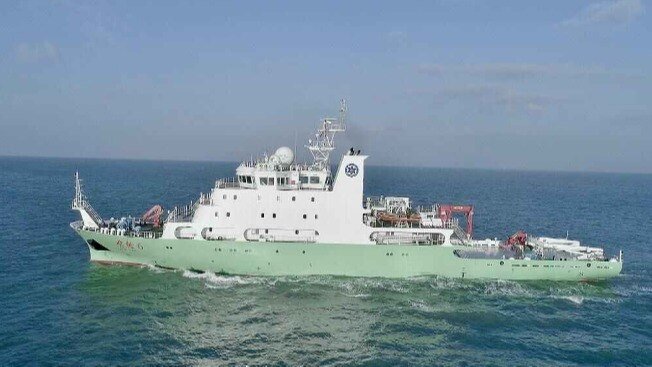The Chinese research vessel Shi Yan 6 arrived at Colombo port in Sri Lanka, despite security concerns expressed by neighboring India. The vessel was granted permission to enter Colombo’s port for replenishment, as confirmed by Sri Lanka’s foreign ministry spokesperson, responding to questions regarding India’s apprehensions.
Shi Yan 6’s intended purpose was to conduct research in the Sri Lankan Exclusive Economic Zone, collaborating with Sri Lanka’s National Aquatic Resources Research and Development Agency (NARA). However, an official statement clarified that the permission granted was solely for replenishment, and no research activities would take place during the vessel’s stay in Colombo.
The presence of Chinese research vessels in Sri Lankan waters, particularly the Indian Ocean, has raised concerns, primarily regarding the potential dual-purpose use of these vessels. Shi Yan 6, like other similar vessels, is designed to conduct not only maritime surveys but also seabed research, crucial for future operations and expansions of the Chinese Navy in the Indian Ocean.
China has been actively pursuing maritime activities in the Indian Ocean for over a decade, as part of its broader Indo-Pacific strategy. This has led to increased attention and concerns, particularly from India, as China’s presence and activities in these waters can potentially affect regional security dynamics.
One of India’s primary concerns is the possibility of the vessel’s tracking systems being used to gather intelligence on Indian defense installations. In the past, the docking of Chinese research vessels, such as the ballistic missile tracker ‘Yuan Wang 5,’ in Sri Lankan ports triggered strong reactions from India. Yuan Wang 5 has military surveillance capabilities and can track intercontinental ballistic missiles.
Shi Yan 6’s seabed research may be aimed at assessing future submarine operations of the People’s Liberation Army (PLA) Navy. It is speculated that these operations could potentially be initiated by 2025.
Sri Lanka’s role in allowing or denying the docking of such vessels is noteworthy. The country is grappling with a significant debt burden, including a substantial amount owed to China, which has resulted in debt-equity swaps like the one involving the Hambantota port. China accounts for a considerable portion of Sri Lanka’s loans, making it a significant financial partner for the island nation.
The continued presence and activities of Chinese research vessels in the Indian Ocean are expected to remain a point of contention among regional powers as they navigate the evolving dynamics of the Indo-Pacific region.
